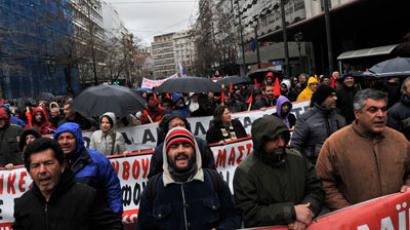‘Under threat euro has short future’ - ex-EU chief accountant
The Eurozone’s economy has stalled with unemployment the only thing that’s showing growth, says former chief accountant for the European Commission, Marta Andreasen.
The economic crisis is partly due to policies that the European Commission put in place – yet it doesn’t take responsibility for its actions, she said. Andreasen spoke with RT about the future of the European Union. RT:EU leaders have been bracing themselves for a market panic over the summer but that never really happened. Does that mean we’re now out of the woods?Marta Andreasen: Well I think what’s happening is that people and markets are still awaiting Thursday’s outcome, of the board that deals with the policies of the European Central Bank. And there’s also the decision of the German court about the stability mechanism. So I think it’s too early to say if we are out of the woods. I think being ‘out of the woods’ is still a long way away – if we ever get there at all.RT:Do you feel that the Euro, as a single currency, is still under threat?MA: Yes. For me, it’s deeply under threat. What will come out of these meetings that I have mentioned is probably a way to sort out the most immediate problem, which is the fact that Italy and Spain have to borrow at very high interest rates. But the essence is that the economy is not growing. The essence is that unemployment is growing. Part of this bailout is going to banks that are in very bad shape, mainly in Spain. In my view, those banks should be closed. Those bailouts are a waste of money. RT:You mentioned that a German court is going to decide on the legality of a fiscal pact for Germany. What will the court’s decision be, in your view?MA: I think the Germans will be forced to agree to this. Not the pact itself, but the stability fund, which is going to bail out all the member states that are in trouble. The issue with this fund is it has very important ties to austerity measures. And then it is left to the interpretation of the different member states and what they interpret as austerity measures.RT:The ECB could buy sovereign bonds, but if it does, it will impose tougher austerity measures on the countries – but countries don’t want to agree to that, do they?MA: Right. But it seems if the ECB buys the bonds, the ties to the austerity measures are more vague than they are if the stability fund is used to finance the member states which are in trouble. All these mechanisms are fairly new and I think the legal framework hasn’t been well thought out. RT:It seems – from what you’re saying – that almost everyone is in the dark – that there are these complicated measures going on which are perceived differently by different countries, depending on their economic position?MA: In Spain, they are trying to force the Prime Minister to actually ask for the bailout. There’s a total confusion because before the summer, Spain got a bailout for its banks and now it seems it’s going to ask for another bailout to save its own economy. It’s not clear if the bailout of the banks was subject to austerity measures or not. There’s a memorandum of understanding still to be signed. But at the end of the day, this is money that is going to have to be printed. This money doesn’t actually exist.RT:This doesn’t sound like an economic bloc that’s working its way out of a crisis in a coherent fashion. MA: No. But for me, it’s no surprise. I was in the commission. People in the commission live in their ivory tower. They don’t understand what the issue is with the economy in the European Union. We are where we are because of the lack of discipline of the member states, but also because of the lack of control of the European Commission on the policies that they have put out. This crisis is to a large extent a result of the good or bad policies they’ve put in place. But they don’t assume any responsibility.RT: Angela Merkel has just come back from a trip from China, where she tried to restore the confidence of Chinese investors in Europe. How attractive do you think European assets are at the moment, to nations like China?MA: The European Union – the European parliament, even – has legislated in a way that they have totally opened our markets to the Chinese and other investors. Right now, they have an easy ride but this is a problem for us, because our industry has ceased to grow because these people are invading our markets. So China, for me, is not the solution. The solution for us in Europe is enhancing our industries, growing our industries, and getting people employed. RT:So that’s the price that European countries might pay for Chinese investment?MA: Yes. If I had to decide, I wouldn’t be very happy about Chinese investment. Obviously in times of crisis, you have to do the best you can. But China, for us, does not represent a big opportunity. I think we represent more of an opportunity for them than they do for us. RT:Bulgaria has just frozen its plans to join the Eurozone. It does remain a member of the EU, though. What advantages does Bulgaria get by remaining part of the EU but not part of the Eurozone?MA: It gets the funding. There is this issue about structured funding because all these newcomers into the EU are now getting a large bulk of the funding, whereas the old ones like Greece, Spain, Italy, France, and the UK are obviously getting less. So I think the Bulgarians have been very clever. They’re getting out of the euro problem but still remain important recipients of structured funding.RT:Of all the issues we’ve talked about – now that the EU has ‘gone back to school,’ what’s your major concern?MA: Obviously a major concern from an economic point of view is what they’re going to propose in order to create employment. And I haven’t heard good ideas in this regard. From a budget point of view, I think the EU budget should be reduced. We’ve invested more than 150bn in the last year, and what have we got? We’ve got this crisis. RT: The ratings agency Moody’s has revised its outlook of the EU’s debt rating to ‘negative.’ What does this mean for investors in European countries?MA: It’s bad news for European countries – for the Eurozone as a whole. Credit rating agencies are part of the problem and part of the solution because they take certain parameters and their rate enforcing causes interest rates go up. So this is a problem to which I don’t know the solution. I think it’s showing that the euro has a short life ahead.














